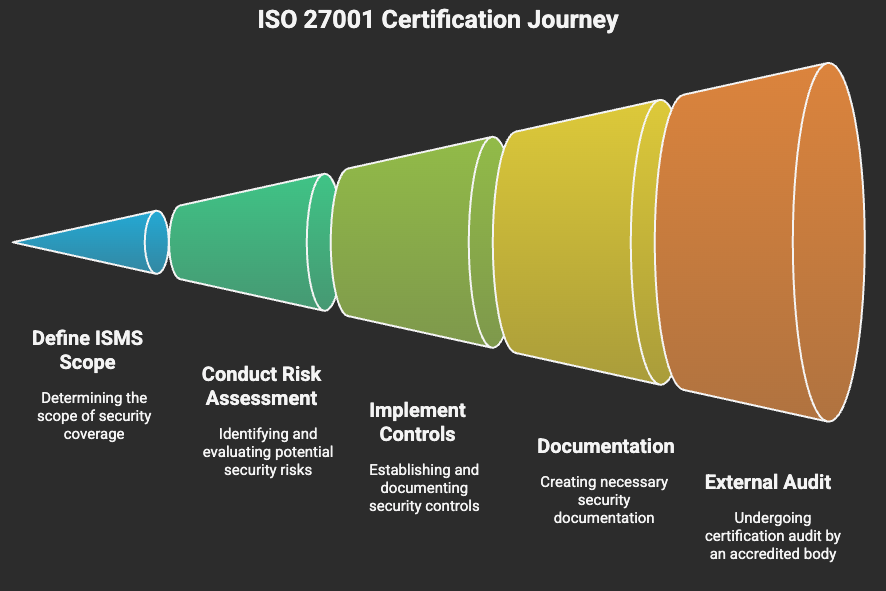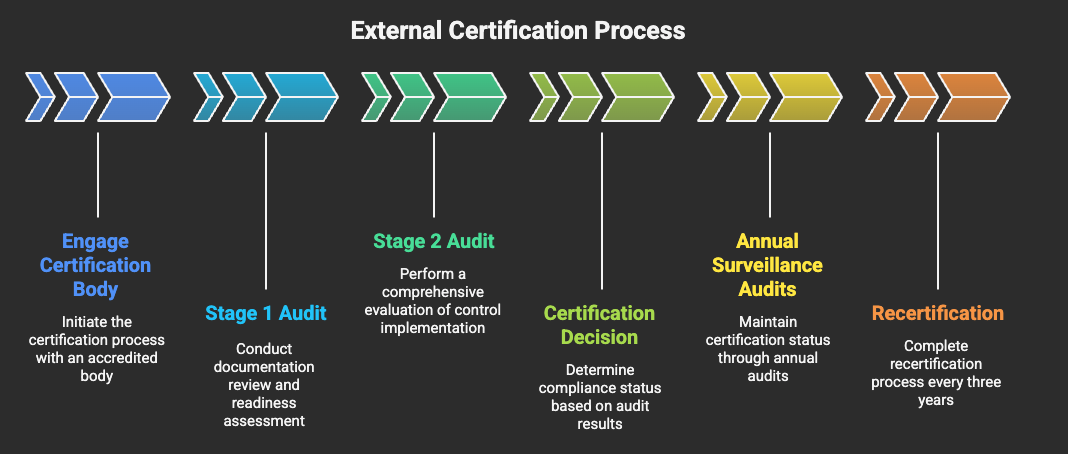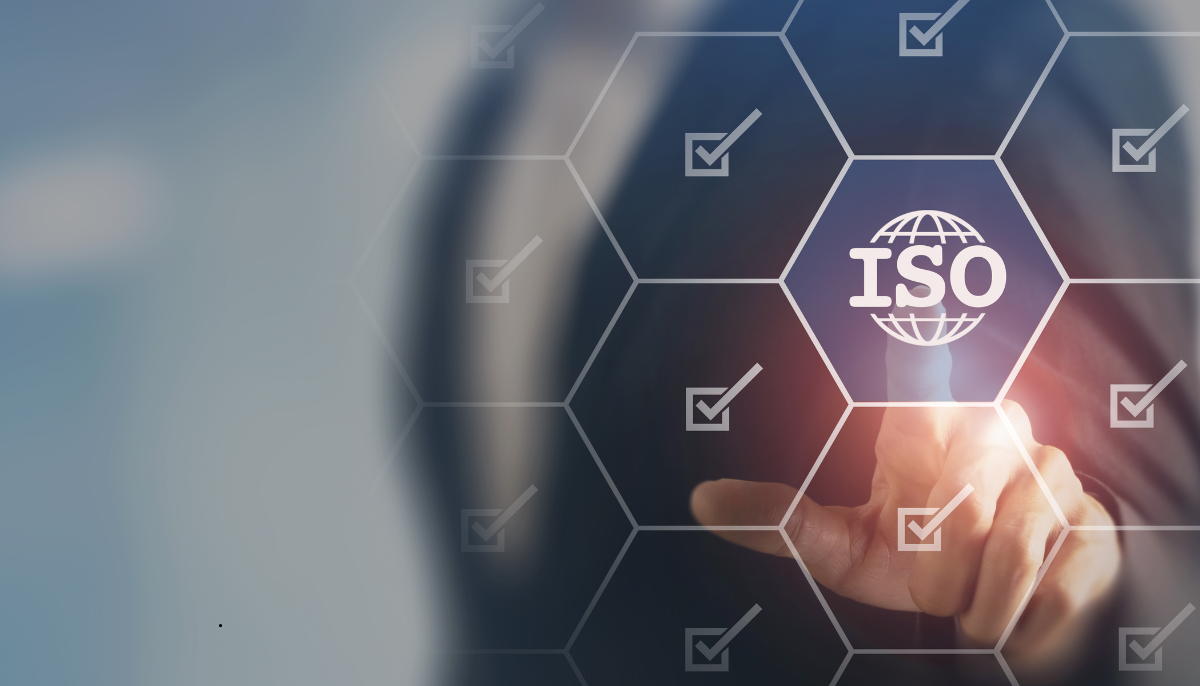Table of Contents
What Is ISO 27001 and Why Should Startup Leaders Care?
The Strategic Value Proposition for Startups
Building Market Credibility and Trust
Unlocking Global Market Opportunities
Attracting Investment and Enhancing Valuation
Creating Operational Efficiencies
When Should Your Startup Pursue ISO 27001?
Industry-Specific Considerations
Competitive Landscape Analysis
Understanding the Certification Journey
Implementing the Control Framework
External Certification Process
Strategic Implementation Approaches for Startups
Phased Implementation Strategy
Leveraging Automation and Compliance Platforms
Integration with Existing Frameworks
Conclusion: Making the Strategic Decision
What Is ISO 27001 and Why Should Startup Leaders Care?
ISO 27001 represents the global gold standard for information security management. At its core, it provides a comprehensive framework for establishing, implementing, and continuously improving an Information Security Management System (ISMS). This international standard doesn't just verify that you have security controls in place. It ensures these controls are part of a cohesive system designed to protect your organization's critical information assets.
For startup founders and CEOs, ISO 27001 certification transcends being merely a compliance checkbox. It serves as tangible evidence of your commitment to information security, demonstrating organizational maturity that resonates with potential clients, investors, and partners. In today's digital landscape where data breaches regularly make headlines, this certification provides a competitive advantage that can accelerate your growth trajectory.
The Strategic Value Proposition for Startups
The true value of ISO 27001 certification extends far beyond security alone. When evaluating whether this investment aligns with your startup's priorities, consider these strategic benefits:
Building Market Credibility and Trust
In competitive markets (e.g. Germany), ISO 27001 certification serves as a powerful trust signal that distinguishes your startup from competitors. This third-party validation of your security practices carries significant weight when engaging enterprise clients who increasingly require formal security assurances before signing contracts. Rather than repeatedly addressing security questions during sales cycles, certification provides instant credibility that can dramatically reduce friction in your sales process.
Unlocking Global Market Opportunities
While North American markets may sometimes function with different certification requirements (e.g. SOC 2), international expansion often necessitates recognized security credentials. European markets in particular frequently require ISO 27001 certification as a baseline expectation for handling sensitive data. By achieving certification proactively, you position your startup to seamlessly enter global markets without security becoming a barrier to entry.
Attracting Investment and Enhancing Valuation
The investment landscape has evolved significantly regarding security expectations. Private equity firms and venture capitalists increasingly view robust security practices as essential risk management rather than optional overhead. A formal ISO 27001 certification can positively influence valuation discussions by demonstrating that cybersecurity risks have been systematically addressed, potentially increasing your startup's value during funding rounds.
Creating Operational Efficiencies
Though the certification process requires initial investment, many startups discover unexpected operational benefits. The systematic examination of processes often reveals inefficiencies, redundancies, and security gaps that, when addressed, create more streamlined operations. These improvements frequently generate cost savings that offset certification expenses over time.
When Should Your Startup Pursue ISO 27001?
Not every early-stage startup needs immediate ISO 27001 certification. Understanding the inflection points that signal when this investment becomes strategically valuable helps prioritize this initiative appropriately:
Industry-Specific Considerations
Your startup's industry significantly influences certification timing. If you operate within highly regulated sectors (financial services, healthcare, critical infrastructure), pursuing certification earlier makes strategic sense. Similarly, if your business model involves handling sensitive client data or personal information, certification provides essential risk mitigation.
Growth Stage Indicators
The optimal timing often correlates with specific growth milestones:
- When enterprise sales become a significant revenue channel
- When international expansion becomes a strategic priority
- When pursuing Series B or later funding rounds where due diligence scrutiny intensifies
- When scaling operations requires standardized security processes across growing teams
Competitive Landscape Analysis
Examine whether your direct competitors hold ISO 27001 certification. In markets where certification has become an expected qualification, lacking this credential can create competitive disadvantages during procurement evaluations. Conversely, being the first certified provider in your segment can create meaningful differentiation.

Understanding the Certification Journey
The ISO 27001 certification process involves several distinct phases that startups should understand before embarking on this journey:
Defining Your ISMS Scope
The first critical decision involves determining what aspects of your organization the ISMS will cover. For most startups, an appropriate scope typically encompasses:
- Your core product or service offering
- Critical business processes supporting delivery
- Essential IT infrastructure supporting these processes
- Physical locations where in-scope activities occur
- Key vendor relationships and data flows
Carefully defining this scope balances comprehensive security coverage against practical implementation constraints. An overly ambitious scope increases complexity, while an artificially narrow scope diminishes certification value.
Risk Assessment Framework
A structured risk assessment forms the foundation of your ISMS, identifying:
- Information assets requiring protection
- Potential threats to these assets
- Existing vulnerabilities that could be exploited
- Likelihood and potential impact of security incidents
- Risk treatment strategies (mitigation, transfer, acceptance)
This assessment must be thoroughly documented, regularly reviewed, and used to prioritize security investments. For startup leaders, this process provides valuable insights into your organization's most significant security risks.
Implementing the Control Framework
ISO 27001 identifies 93 security controls across 4 domains that must be considered. Your organization will:
- Evaluate each control for applicability to your specific risk profile
- Document which controls you're implementing (and justifications for any exclusions)
- Develop policies, procedures, and technical systems to implement required controls
- Create evidence demonstrating control effectiveness
The implementation phase typically constitutes the most resource-intensive part of the certification journey, requiring cross-functional collaboration and executive sponsorship.
Documentation Requirements
Comprehensive documentation underpins a successful certification. Required documentation typically includes:
- Information Security Policy
- Risk Assessment Methodology and Results
- Statement of Applicability
- Security Objectives and Metrics
- Defined Roles and Responsibilities
- Incident Management Procedures
- Business Continuity Plans
While documentation creation requires significant effort, these documents ultimately provide valuable operational clarity for growing organizations.
External Certification Process
The formal certification involves engaging an accredited certification body to conduct:
- Stage 1 Audit: Documentation review and readiness assessment
- Stage 2 Audit: Comprehensive evaluation of control implementation
- Certification Decision: Formal determination of compliance status
Following successful certification, annual surveillance audits maintain certification status, with a complete recertification required every three years.

Internal Resource Allocation
The most significant investment often comes from internal resource commitments:
- Dedicated project management (typically 50-100% of one FTE during implementation)
- Subject matter expert time from across the organization
- Executive sponsorship and governance participation
- Ongoing maintenance and continuous improvement activities
For most startups, assigning clear ownership of the certification initiative is critical for success, whether through dedicated compliance personnel or allocating responsibility to existing technical leadership.
Strategic Implementation Approaches for Startups
When pursuing ISO 27001 certification with limited resources, consider these strategic approaches:
Phased Implementation Strategy
Rather than attempting a comprehensive implementation immediately, consider:
- Starting with a focused scope covering your most critical systems
- Establishing foundational controls that address highest-priority risks
- Gradually expanding scope and control maturity over multiple cycles
- Leveraging surveillance audits to demonstrate continuous improvement
This approach allows certification benefits to be realized earlier while distributing implementation costs over a longer timeframe.
Leveraging Automation and Compliance Platforms
Modern GRC platforms can significantly reduce manual effort throughout the certification lifecycle. These platforms offer:
- Automated evidence collection from cloud infrastructure
- Control mapping across multiple compliance frameworks
- Streamlined policy management and distribution
- Continuous compliance monitoring and alerting
While representing an additional investment, these platforms often deliver positive ROI through reduced labor costs and improved audit readiness.
Integration with Existing Frameworks
Many startups have already implemented aspects of other security frameworks like SOC 2, NIST, or cloud provider security best practices. Identifying overlaps between these frameworks and ISO 27001 requirements allows you to leverage existing investments rather than duplicating efforts.
Conclusion: Making the Strategic Decision
ISO 27001 certification represents a significant but valuable investment for growth-focused startups. When evaluating this initiative, founders and CEOs should:
- Assess your specific market requirements and competitive landscape
- Consider the current maturity of your security program
- Evaluate available internal resources and expertise
- Determine the optimal timing based on growth trajectory
- Develop a realistic budget and implementation timeline
The most successful implementations occur when certification is viewed not merely as a compliance exercise but as a strategic business enabler that supports growth objectives through enhanced trust, operational efficiency, and risk reduction.
By approaching ISO 27001 certification with clear strategic intent, startups can maximize the return on this investment while building security practices that scale alongside business growth.
How Secureleap Simplifies Your Compliance Journey
Secureleap offers tailored packages designed specifically for SMBs seeking efficient, cost-effective certification:
Our Solution Tiers:
Foundational
- Access to our comprehensive compliance platform
- Self-service tools for documentation and control implementation
- Knowledge base and templates specific to ISO 27001
Audit Ready
- All Foundational features
- Bundled audit services (ISO 27001 or SOC 2 Type 2)
- Pre-audit readiness assessment
- Streamlined audit coordination
Full Service
- Complete compliance management
- Documentation preparation and implementation support
- Includes penetration testing and internal audit services
- Dedicated compliance manager
We also offer custom packages to address your specific needs and compliance goals.
We've consolidated everything you need to make your compliance journey smooth, efficient, and predictable.
Contact us today to discuss how we can streamline your path to ISO 27001 certification.
More info at https://secureleap.tech/

